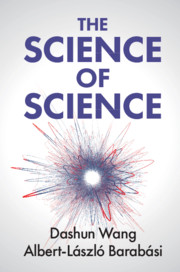Book contents
- The Science of Science
- The Science of Science
- Copyright page
- Dedication
- Contents
- Acknowledgements
- Introduction
- Part I The Science of Career
- Part II The Science of Collaboration
- Part III The Science of Impact
- 15 Big Science
- 16 Citation Disparity
- 17 High-Impact Papers
- 18 Scientific Impact
- 19 The Time Dimension of Science
- 20 Ultimate Impact
- Part IV Outlook
- Book part
- References
- Index
20 - Ultimate Impact
from Part III - The Science of Impact
Published online by Cambridge University Press: 07 February 2021
- The Science of Science
- The Science of Science
- Copyright page
- Dedication
- Contents
- Acknowledgements
- Introduction
- Part I The Science of Career
- Part II The Science of Collaboration
- Part III The Science of Impact
- 15 Big Science
- 16 Citation Disparity
- 17 High-Impact Papers
- 18 Scientific Impact
- 19 The Time Dimension of Science
- 20 Ultimate Impact
- Part IV Outlook
- Book part
- References
- Index
Summary
Given the jump–decay citation patterns discussed in the previous chapter, are we forced to conclude that the papers we publish will be relevant for only a few years? We find that while aggregate citations follow a clear pattern, the trajectories of individual citations are remarkably variable. Yet, by analyzing individual citation histories, we are able to isolate three parameters – immediacy, longevity, and fitness – that dictate a paper’s future impact. In fact, all citation histories are governed by a single formula, a fact which speaks the universality of the dynamics that at first seemed quite variant. We end by discussing how a paper’s ultimate impact can be predicted using one factor alone: its relative fitness. We show how papers with the same fitness will acquire the same number of citations in the long run, regardless of which journals they are published in.
Keywords
- Type
- Chapter
- Information
- The Science of Science , pp. 209 - 220Publisher: Cambridge University PressPrint publication year: 2021

